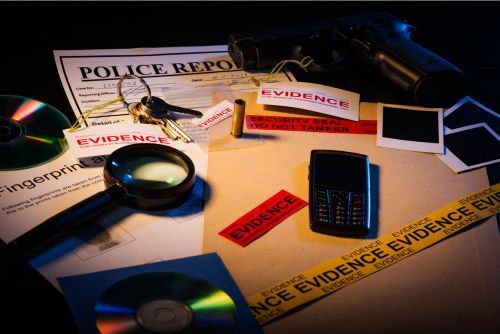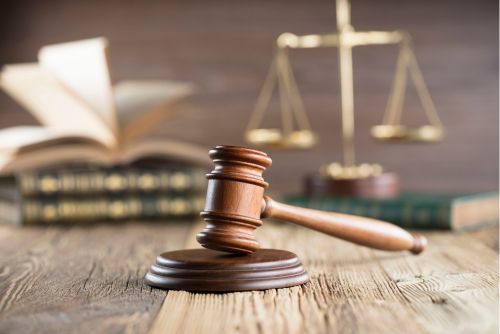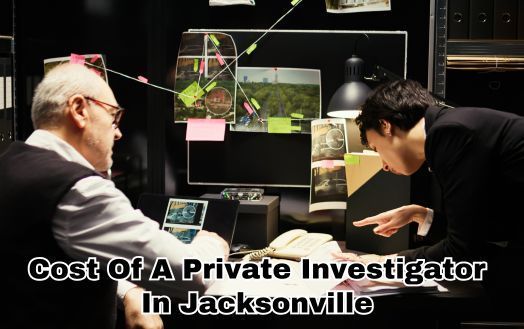What Are The Disadvantages Of Private Investigator

As someone who has always been fascinated by the world of investigation and solving mysteries, I am well aware that there are two sides to every coin. In this article, we will delve into what are the disadvantages of private investigator – a profession that is often glamorized in movies and novels. While it may seem like an exciting and thrilling career choice, there are several challenges and drawbacks that one must consider before embarking on this path.
Firstly, one of the major downsides of being a private investigator is the lack of privacy. As an investigator, you are constantly delving into other people's lives, digging up their secrets, and invading their personal space. This can take a toll on your own sense of privacy as well. It becomes difficult to separate your professional life from your personal life, as you find yourself constantly surrounded by surveillance equipment and immersed in the lives of others. Maintaining a balance between work and personal relationships can be quite challenging in such circumstances.
Additionally, another disadvantage is the limited jurisdiction that private investigators have. Unlike law enforcement agencies who have broader authority to conduct investigations across different jurisdictions, private investigators often face restrictions when it comes to crossing state or international borders. This limitation can hinder their ability to gather crucial information or track down individuals who may have fled from one jurisdiction to another. It requires them to rely heavily on local authorities for assistance or collaboration which can sometimes slow down the investigative process significantly.
Despite these challenges, private investigators play an essential role in our society by uncovering truth and bringing justice where it is due. However, it is important for aspiring detectives or those curious about this profession to be aware of these potential disadvantages before diving headfirst into this exciting yet demanding world of investigation.
Potential Disadvantages In Hiring A Private Investigator
You might find yourself overwhelmed by the potential disadvantages of hiring a private investigator, leaving you feeling frustrated and regretful. One major concern is the possibility of hiring unlicensed investigators. These individuals may lack the necessary training and expertise to handle your case effectively, potentially jeopardizing the quality of their work and the outcome you desire.
Moreover, employing unlicensed investigators could also pose a security risk, as they may not have undergone proper background checks or adhere to ethical standards.
Another drawback of hiring a private investigator is the potential risks involved. Depending on the nature of your case, there could be inherent dangers associated with gathering information or conducting surveillance. Private investigators often work in sensitive situations that can expose them to unpredictable and potentially hazardous circumstances. This factor alone can add stress and anxiety to both you as the client and the investigator themselves.
Furthermore, working with a private investigator can be time-consuming and impact job security. Investigations often require long hours of dedicated work, which might not align well with your personal schedule or professional commitments. Additionally, due to the nature of their work being project-based rather than long-term employment, there is no guarantee for steady income or job stability.
Considering these potential disadvantages mentioned above including unlicensed investigators posing security risks, potential hazards involved in investigations, as well as challenging hours impacting job security; it becomes evident that hiring a private investigator has its share of concerns.
Lack Of Privacy

Privacy can be compromised when hiring a private investigator. While they're professionals trained in investigative work, their very nature of digging into someone's personal life can intrude on the privacy of individuals involved. Whether it's conducting surveillance or gathering information, a private investigator may delve deep into personal matters that were meant to be kept confidential.
This lack of privacy is one of the potential disadvantages of seeking the services of a professional investigator. Hiring a private investigator means allowing someone else access to your personal and sensitive information. They may go through your financial records, medical history, or even monitor your online activities. This intrusion can make people feel uncomfortable and vulnerable, as their secrets are exposed to an outsider. Despite the intention being for legitimate reasons such as finding missing persons or uncovering fraud, the lack of privacy is an inherent risk that comes with involving a private investigator.
Moreover, when dealing with a private investigator, it's important to remember that they have no obligation to keep your information confidential once their job is done. While professional investigators adhere to strict ethical standards concerning client confidentiality during active cases, there's no guarantee that this will continue after their involvement ends. The possibility exists that any personal details shared during the investigation could potentially become public knowledge at some point in the future.
While hiring a private investigator can have its benefits for certain situations requiring specialized investigative skills, it also comes with the disadvantage of compromising one's privacy. The invasive nature of their work and potential exposure of personal information make it crucial for individuals seeking such services to carefully weigh the risks and benefits involved.
With this understanding of how lack of privacy affects those who engage with private investigators in mind, let's now explore another drawback: limited jurisdiction.
Limited Jurisdiction
One of the drawbacks of hiring a private investigator is their limited jurisdiction, which can leave individuals feeling frustrated and powerless. Private investigators are typically only granted authority to investigate within a specific geographical area or for certain types of cases.
This means that if your case falls outside their jurisdiction, they may not be able to assist you. For example, if you need help with an investigation that spans multiple states or countries, a private investigator may not have the legal authority to conduct the necessary inquiries in those areas. This limitation can greatly restrict the scope of their investigations and hinder their ability to gather crucial information.
Furthermore, limited jurisdiction also means that private investigators may not have access to certain databases or resources that are essential for some cases. They rely heavily on public records, interviews, surveillance, and other traditional investigative methods. While these techniques can be effective in many situations, there are instances where accessing specialized databases or obtaining specific legal permissions is required. In such cases, private investigators may face significant obstacles and may not be able to provide the level of assistance needed.
While private investigators offer valuable services in many circumstances, their limited jurisdiction can pose significant disadvantages for clients seeking comprehensive investigations. Being unable to operate outside specific boundaries or lacking access to important resources can limit their effectiveness and frustrate clients who require more extensive assistance. Nevertheless, it's important to remember that these limitations vary depending on the individual investigator and the nature of each case.
Costly Fees In Hiring A Private Detective

Looking to hire a private investigator? Brace yourself for the potential sticker shock that comes with their services.
Private investigators can be quite expensive, which is one of the major disadvantages for clients seeking their assistance. The costly fees associated with hiring a private investigator can quickly add up and become a burden on individuals or businesses in need of their investigative services.
When it comes to the financial aspect of investigations, private investigators often charge by the hour or require an upfront retainer fee. This means that even simple cases can end up being quite costly, especially if they take longer than expected to resolve. Additionally, expenses such as travel costs, surveillance equipment, and background checks may also be passed on to the clients. All these factors contribute to making private investigation services financially challenging for many.
To further highlight the drawbacks of costly fees in private investigations, here is an unordered list:
- The high cost may deter some individuals or businesses from pursuing necessary investigations.
- Clients may feel pressured to make quicker decisions due to budget constraints.
- Some clients may opt for cheaper alternatives that might not offer the same level of expertise or reliability.
- Costly fees can limit access to justice for those who cannot afford them.
Despite these disadvantages related to expensive fees, there are other concerns when it comes to hiring a private investigator. These include legal and ethical considerations that must be taken into account throughout the investigative process.
Legal And Ethical Concerns For Every Case
When it comes to hiring a private investigator, clients must be mindful of the potential legal and ethical concerns that can arise during the investigative process. Private investigators are bound by certain laws and regulations that govern their work, such as privacy laws and rules of evidence. It is crucial for both clients and investigators to understand and adhere to these legal requirements in order to avoid any legal repercussions.
Additionally, ethical concerns may also arise, especially when it comes to invasion of privacy or gathering information through deceitful means. These considerations make it essential for clients to thoroughly vet the private investigator they choose to ensure they have the necessary skills and knowledge to handle cases within the legal and ethical boundaries.
Ethics play a vital role in every profession, including that of private investigators. The nature of their work often involves delving into personal matters or conducting surveillance on individuals without their knowledge. This raises questions about privacy rights and whether obtaining information through covert methods is ethically justifiable. Clients should be aware of these concerns and discuss them openly with the private investigator before proceeding with any investigation.
Furthermore, there is always a risk that unethical practices could compromise the validity or admissibility of evidence collected by private investigators. If evidence is obtained illegally or unethically, it may not hold up in court or even worse, it could lead to legal consequences for both the investigator and client involved. Therefore, ensuring that the chosen private investigator possesses strong investigative skills while also adhering to strict ethical standards becomes paramount.
When considering hiring a private investigator, one must take into account not only their investigative skills but also the potential legal and ethical issues that may arise throughout the process. Clients should carefully select an experienced professional who understands and abides by all relevant laws regarding privacy rights and rules of evidence gathering. By doing so, they can mitigate risks associated with illegal or unethical practices commonly associated with investigations conducted by private detectives.
Risk Of Physical Danger From People Involved

To truly understand the risks involved, you need to be aware of the potential physical danger that can arise when hiring a private investigator. While their job may seem exciting and adventurous, it also comes with its fair share of hazards.
Here are some of the risk of physical danger that a private investigator may face:
- Confrontation: Private investigators often find themselves in situations where they have to confront individuals who may not want to be investigated. This can lead to tense and potentially dangerous encounters.
- Surveillance: One of the main tasks of a private investigator is conducting surveillance on individuals or locations. This can involve following someone for long periods, sometimes even at odd hours. It puts them at risk of being noticed by the subject or encountering dangerous situations.
- Theft and vandalism: In certain cases, private investigators may need to gather evidence by entering premises without permission. This exposes them to the risk of being caught and facing legal consequences or even physical harm from property owners.
- Personal safety: When delving into sensitive investigations, private investigators may uncover information that powerful people or criminal organizations would rather keep hidden. This puts their personal safety at stake as they become targets for those who want to silence them.
As you can see, being a private investigator is not without its dangers. The risks associated with this line of work include potential confrontations, surveillance hazards, theft/vandalism accusations, and threats to personal safety. Despite these disadvantages, investigative work continues because we live in an age where innovation thrives on unraveling mysteries and uncovering truth.
Moving forward into the subsequent section about the 'time-consuming process,' it is important to note that dealing with physical danger is just one aspect that makes being a private investigator challenging; another obstacle they face is the time-consuming nature of their work.
Private Investigation Is A Time-Consuming Process
Knowing what are the disadvantages of private investigator is important before hiring one. While the risk of physical danger is certainly a major concern for private investigators, another significant disadvantage of this profession is the time-consuming process involved in conducting investigations.
As a private investigator, I often find myself spending countless hours gathering information, analyzing data, and following leads. This can be incredibly tedious and exhausting, especially when working on complex cases that require extensive research and surveillance.
One of the reasons why private investigations can be so time-consuming is because they often involve uncovering hidden or confidential information. Tracking down individuals, interviewing witnesses, and sifting through various records takes a great deal of time and effort. Additionally, there are legal restrictions and privacy laws that must be adhered to during the investigation process, which further adds to the complexity and length of each case.
Moreover, private investigators are often faced with tight deadlines set by their clients. They expect quick results and prompt updates on the progress of their case. This pressure can lead to long hours spent working tirelessly to meet these expectations. It's important for individuals considering a career in this field to understand that it requires patience, persistence, and an unwavering commitment to detail.
As challenging as it may be to navigate through the time-consuming process of conducting private investigations, there is yet another disadvantage that must be addressed: inaccurate or incomplete information. While we strive for accuracy in our work as investigators, there are instances where crucial details may go unnoticed or misinterpreted.
In my next section, I will delve into this issue further and explore how it can impact the effectiveness of private investigations without sacrificing integrity or efficiency.
Inaccurate Or Incomplete Information

Despite the time-consuming nature of private investigations, the presence of inaccurate or incomplete information can significantly hinder the effectiveness and efficiency of the process. As a private investigator, I've encountered numerous cases where the information provided was either misleading or insufficient. This lack of accurate data makes it challenging to build a solid case and gather substantial evidence. Without reliable information, my experience and expertise become less effective in solving cases efficiently.
- Incomplete records: Often, during an investigation, I come across incomplete records or missing pieces of information. This could be due to various reasons such as poor documentation or intentional concealment by individuals involved in the case. In such situations, I have to spend additional time and effort seeking out alternative sources or attempting to fill in the gaps through interviews and further research.
- Misleading witnesses: Another challenge arises when witnesses provide inaccurate or misleading statements. People may unintentionally distort facts due to faulty memory, biases, or fear of repercussions. It becomes crucial for me as an investigator to cross-reference their statements with other available evidence and identify any inconsistencies that may arise.
- False leads: Sometimes, unreliable tips from informants or anonymous sources can lead us down paths that ultimately prove fruitless. Investigating false leads not only wastes valuable time but also diverts resources away from pursuing more viable avenues for gathering evidence.
- Outdated information: The passage of time can render previously gathered information obsolete, especially in long-term investigations. Witnesses may relocate or change their contact details, making it difficult to track them down again for further questioning or collaboration on the case.
Working as a private investigator requires navigating through challenges presented by inaccurate or incomplete information during an investigation process. Despite my experience and expertise in gathering evidence and building cases efficiently, reliance on flawed data hampers progress significantly at times.
Reliance On Subject Cooperation
One major challenge faced in investigations is the heavy reliance on subject cooperation, which can greatly impact the outcome. As a private investigator, I often find myself relying on the willingness of individuals to provide information or participate in interviews.
However, not everyone is cooperative or forthcoming with the truth. This lack of cooperation can hinder the progress of an investigation and make it difficult to gather accurate and reliable information.
In cases where subjects are uncooperative, it may be necessary for investigators to resort to other methods such as surveillance or background checks. These alternative methods can help fill in some of the gaps left by uncooperative subjects but may not provide a complete picture. Without full cooperation from all parties involved, there is always a risk of missing crucial information that could be vital to solving a case.
Furthermore, reliance on subject cooperation also means that investigators have limited control over the pace and direction of an investigation. They must rely on others to provide them with information, which can lead to delays and inefficiencies. This lack of control can be frustrating for investigators who are driven by a desire for efficiency and results.
While private investigation offers many benefits, one major disadvantage is the heavy reliance on subject cooperation. Investigators depend on individuals being cooperative and forthcoming with information, which is not always guaranteed. This dependence can lead to incomplete or inaccurate information being gathered during an investigation.
The next section will explore another drawback faced by investigators - the emotional toll that this profession takes on them.
Emotional Toll On Investigators

Navigating the emotional toll as an investigator can be challenging, but it's essential to acknowledge and address the impact it has on you. Being a private investigator comes with its fair share of disadvantages, and one significant drawback is the emotional toll it takes on investigators. Here are three key ways in which this toll manifests itself:
- Exposure to distressing situations: As a private investigator, you often find yourself immersed in cases involving infidelity, missing persons, or even criminal activities. Witnessing these distressing situations firsthand can have a profound effect on your emotions and mental well-being. It requires a great deal of resilience to cope with the constant exposure to human suffering.
- Emotional detachment challenges: While it's crucial for investigators to remain objective during their work, maintaining emotional detachment can be incredibly demanding. Investigators often form connections with their clients or become involved in highly sensitive cases where empathy is vital for gaining trust and obtaining critical information. Balancing professional detachment while still being empathetic can take a toll on an investigator's emotional state.
- Moral dilemmas: Private investigators frequently encounter ethical grey areas that can lead to moral dilemmas. They may come across evidence that could potentially harm innocent people or disrupt relationships beyond repair. Making tough decisions about when and how to disclose information requires careful consideration and can lead to internal conflicts that contribute further to the emotional burden.
Acknowledging these challenges is crucial because they highlight just how emotionally taxing being a private investigator can be. However, despite these disadvantages, there remains an undeniable need for specialized skills in this field – which brings us to why having specific expertise is vital when taking on such emotionally demanding work.
Need For Specialized Skills To Become Pros
Having the right expertise is crucial when undertaking emotionally demanding work as a specialized skillset becomes essential. In the world of intelligence investigations and criminal investigation, professional investigators need to possess a unique set of skills to effectively gather information and solve cases.
These specialized skills go beyond what can be learned through general knowledge or experience. It requires a deep understanding of investigative techniques, legal protocols, and the ability to analyze complex situations. Hiring individuals with these specific skills ensures that the investigation is conducted efficiently and accurately.
One of the most important skills for a private investigator is their ability to gather intelligence effectively. This involves knowing how to access various sources of information, such as public records, databases, and social media platforms. Professional investigators have honed their skills in navigating these resources and are adept at uncovering hidden or hard-to-find information. They know how to dig deeper into leads, connect dots that others may miss, and gather evidence that can stand up in court.
Another crucial skill for a private investigator is their ability to conduct thorough and precise investigations. They must have an analytical mind that can make sense out of seemingly unrelated pieces of information. This involves gathering evidence from multiple sources, analyzing it critically, and forming logical conclusions based on facts rather than assumptions or personal biases. These skills are essential in criminal investigations where accuracy is paramount.
Having specialized skills is vital for private investigators when conducting emotionally demanding work such as intelligence investigations or criminal investigation cases. The ability to gather intelligence effectively and conduct thorough investigations sets professional investigators apart from those without proper training or experience in this field. By hiring individuals with these specific skills, clients can ensure that their cases are handled with utmost professionalism and accuracy.
Transitioning into the subsequent section about the 'difficulty in obtaining evidence,' it becomes clear that these specialized skills play a significant role in overcoming challenges during an investigation without compromising on quality results.
Difficulty In Obtaining Evidence

Acquiring the necessary evidence can present challenges in the field of intelligence investigations and criminal investigation, as I must navigate legal protocols and overcome obstacles to gather accurate and admissible information. As a private investigator, one of the major disadvantages is the difficulty in obtaining evidence. Unlike law enforcement agencies, I don't have the same authority or resources at my disposal.
This means that I often have to rely on creativity, persistence, and sometimes even unconventional methods to gather the evidence needed for a case. One challenge I face is accessing certain sources of information. In some cases, individuals or organizations may be hesitant to cooperate with a private investigator due to privacy concerns or fear of legal repercussions. This can make it difficult for me to obtain relevant documents, records, or witness testimonies that could potentially strengthen a case. Additionally, there are limitations on what methods I can use to collect evidence without infringing on people's rights or breaking any laws.
Another obstacle is the ever-evolving digital landscape. With advancements in technology and encryption techniques, it has become increasingly challenging to access digital evidence such as emails, social media accounts, or online communications. Encryption algorithms and privacy settings make it harder for me to retrieve this information without proper authorization or technical expertise.
Despite these difficulties in obtaining evidence as a private investigator, I am constantly adapting my strategies and staying up-to-date with emerging technologies and investigative techniques. Transitioning into the subsequent section about the limited availability of resources, it becomes apparent that not only do we face challenges in gathering evidence but also limitations when it comes to acquiring necessary tools and support for our investigations.
Limited Availability Of Resources
Despite the limited availability of resources, I'm constantly finding innovative ways to conduct thorough investigations and overcome obstacles. As a private investigator, I understand that my job requires me to work with limited resources at times. However, this limitation has never deterred me from delivering exceptional results for my clients. In fact, it's pushed me to think outside the box and come up with creative solutions to gather evidence and uncover the truth.
- Utilizing technology: In today's digital age, technology plays a crucial role in investigations. Despite limited resources, I make use of various technological tools and software to aid in my work. From advanced surveillance equipment to cutting-edge data analysis techniques, I leverage these resources to gather information efficiently and effectively.
- Building a strong network: Limited availability of resources can be compensated by building a strong network of contacts within the industry. Over the years, I've established relationships with professionals from different fields who can provide valuable insights or assistance when needed. This network allows me access to additional resources that may not be readily available otherwise.
- Developing specialized skills: To overcome resource limitations, I continuously invest in developing specialized skills that enable me to handle diverse situations effectively. Whether it's honing my interviewing techniques or mastering new investigative methodologies, these skills help me maximize the impact of the limited resources at hand.
- Prioritizing efficiency: With limited availability of resources, time becomes even more precious. Therefore, I focus on optimizing every aspect of an investigation process to ensure efficiency without compromising quality or accuracy. By streamlining workflows and utilizing efficient strategies, I'm able to make the most out of the available resources.
Despite facing challenges due to the limited availability of resources as a private investigator, my commitment towards innovation drives me forward in delivering exceptional results for my clients' cases. However, this isn't the only disadvantage we face in our line of work; there's also the possibility of legal consequences.
Possibility Of Legal Consequences

Be cautious, as you navigate the challenging world of private investigation, for there's always a looming possibility of facing legal consequences.
As a criminal investigator or fraud investigator, your job may involve gathering evidence and conducting surveillance to uncover illegal activities. However, it's important to remember that you must operate within the boundaries of the law. Private detectives aren't exempt from legal regulations and can face severe consequences if they engage in unethical or illegal practices.
The field of law is complex and ever-evolving, which makes it crucial for private investigators to stay updated on current regulations and guidelines. In order to avoid legal consequences, it's essential to conduct investigations with integrity and professionalism. This means obtaining proper authorization before conducting surveillance or searching for evidence, respecting individuals' privacy rights, and ensuring that all collected evidence is admissible in court.
Private investigators must also be mindful of trespassing laws when conducting their investigations. It's easy for a well-intentioned investigator to unintentionally cross legal boundaries while trying to gather information. However, even minor infractions can lead to serious legal consequences such as fines or even imprisonment.
As we delve deeper into the challenges faced by private investigators, it becomes evident that maintaining objectivity is another significant hurdle in this field. Without falling into clichés like 'taking the next step,' let's explore how remaining unbiased during an investigation poses its own set of difficulties.
Challenges In Maintaining Objectivity
Remaining impartial and unbiased throughout your investigations presents a formidable challenge, as personal biases can inadvertently influence the way evidence is interpreted and conclusions are drawn.
As a private investigator, it's crucial to recognize and overcome these challenges in order to provide accurate and objective findings. Here are three key challenges in maintaining objectivity as a private investigator:
- Confirmation Bias: One of the biggest challenges faced by private investigators is confirmation bias. This occurs when investigators have preconceived notions or beliefs about a case, leading them to interpret evidence in a way that confirms their existing beliefs. It can be difficult to remain open-minded and consider alternative explanations when there's an unconscious desire to validate one's initial assumptions.
- Emotional Involvement: Private investigators often deal with sensitive cases involving personal relationships, such as infidelity or child custody disputes. These emotionally charged situations can make it challenging to maintain objectivity. Emotions may cloud judgment and lead to biased interpretations of evidence or favoring one party over another. It requires self-awareness and professional detachment to ensure that emotions don't interfere with the investigation process.
- Client Expectations: Another challenge in maintaining objectivity arises from client expectations. Clients may have specific outcomes they want from an investigation, which can create pressure for the investigator to find evidence supporting those desired outcomes.
This pressure can compromise objectivity and lead to biased reporting or selective presentation of findings. Balancing client expectations while remaining objective requires clear communication, setting realistic expectations, and prioritizing integrity in delivering unbiased results.
Overcoming these challenges requires constant self-reflection, awareness of personal biases, and adherence to ethical standards within the profession of private investigation. By recognizing these obstacles and actively working towards maintaining objectivity, private investigators can provide reliable information that serves the best interests of their clients while upholding professional integrity.
Wrapping Up
Knowing what are the disadvantages of private investigator before becoming or hiring one. In conclusion, being a private investigator does come with its fair share of disadvantages. The lack of privacy can be a major drawback, as it often requires invading someone else's personal space and digging deep into their lives. This can take a toll on one's own mental and emotional well-being.
Additionally, the limited jurisdiction can restrict the scope of investigations, making it difficult to gather all the necessary information. Furthermore, the costly fees associated with hiring a private investigator can be a deterrent for many individuals or organizations who may not have the financial resources to afford their services. Moreover, legal and ethical concerns are ever-present in this field and must be carefully navigated to avoid potential legal consequences.
Obtaining evidence can also prove challenging at times due to limitations in resources and access. Maintaining objectivity is another challenge faced by private investigators as they need to separate personal biases from their professional work. Despite these drawbacks, private investigators play an important role in assisting individuals or organizations in uncovering truths that might otherwise remain hidden.
It is important to weigh both the advantages and disadvantages before considering pursuing a career or utilizing the services of a private investigator.
Frequently Asked Questions
What Are The Potential Legal Consequences That Private Investigators May Face In Their Line Of Work?
In my line of work as a private investigator, there are potential legal consequences that I must always be mindful of.
One major concern is the violation of privacy laws when conducting surveillance or gathering information. It's crucial to ensure that I'm operating within the boundaries of the law and obtaining evidence through legal means.
Another potential consequence is facing lawsuits from individuals who feel their rights have been violated or their reputation damaged during an investigation. This underscores the importance of conducting thorough research and adhering to ethical guidelines in order to minimize any legal risks.
Additionally, there may be instances where conflicts arise with law enforcement agencies or other professionals in related fields, which can lead to professional challenges and strained relationships.
Despite these potential drawbacks, being a private investigator allows me to innovate and find creative solutions for my clients' needs while navigating the complexities of the legal system.
How Do Private Investigators Overcome The Challenges In Maintaining Objectivity During Their Investigations?
Maintaining objectivity during investigations is a crucial challenge that private investigators constantly face. To overcome this obstacle, I employ various strategies to ensure that my personal biases and emotions don't interfere with the objective gathering of evidence.
Firstly, I always remind myself of the importance of remaining neutral and unbiased throughout the investigation process. This mindset allows me to approach each case with an open mind and avoid making premature judgments.
Additionally, I make a conscious effort to separate my personal beliefs from the facts presented during the investigation, ensuring that my opinions don't cloud my judgment.
To further enhance objectivity, I collaborate with a team of experienced professionals who provide different perspectives on the case, allowing for diverse insights and reducing individual biases.
Moreover, I continually update my knowledge and skills through training programs and industry advancements to stay at the forefront of investigative techniques. This helps me maintain an innovative approach in solving cases.
By adhering to these practices, I can effectively navigate the challenges associated with maintaining objectivity as a private investigator while providing accurate and reliable findings for my clients.
What Are The Resources That Private Investigators Often Find Limited In Availability?
In my experience as a private investigator, one of the most challenging aspects is the limited availability of resources. Whether it's accessing certain databases, obtaining surveillance equipment, or even hiring additional personnel, there are often limitations that hinder our investigations.
This can be frustrating at times, especially when we're working on complex cases that require extensive research or advanced technology.
However, it also pushes us to think outside the box and find innovative solutions to overcome these obstacles. We constantly have to adapt and find alternative methods to gather information and evidence effectively.
While it may seem like a disadvantage initially, this limitation ultimately fuels our creativity and drives us to push the boundaries of what's possible in our field.
Can Private Investigators Obtain Evidence Without The Cooperation Of The Subjects Involved?
Yes, private investigators can obtain evidence without the cooperation of the subjects involved. This is one of the advantages of hiring a skilled and resourceful investigator.
Through their expertise and access to various tools and databases, they can gather information discreetly and legally. They use techniques such as surveillance, background checks, interviews with witnesses, and forensic analysis to uncover crucial evidence.
By following leads diligently and thinking outside the box, private investigators have the ability to discover vital facts that may otherwise go unnoticed. Their innovative approach allows them to overcome obstacles and provide valuable insights that can make a significant difference in solving cases or uncovering hidden truths.
What Emotional Toll Do Private Investigators Experience While Carrying Out Their Investigations?
Carrying out investigations as a private investigator can often take a significant emotional toll on me. The nature of the job requires me to delve into people's personal lives and uncover secrets that they may want to keep hidden. This can lead to feelings of guilt, as I'm invading their privacy and potentially causing harm to their relationships or reputations.
Additionally, the constant pressure to find evidence and meet deadlines can be incredibly stressful, leading to anxiety and burnout. Despite these challenges, I find solace in knowing that my work helps bring truth and justice to light, providing closure for those who seek it.













